BMP4002 - Understanding the UK Legal System: Sources, Laws & Analysis
VerifiedAdded on 2023/06/10
|9
|2452
|474
Report
AI Summary
This report provides a comprehensive analysis of the UK legal system, focusing on its unique features, sources of law, and characteristics. It explores the common law system, legislation, case laws, and international conventions that shape the UK legal framework. The report also delves into different legal systems within the UK, including England and Wales, Scotland, and Northern Ireland. Furthermore, it examines specific areas of law such as contract law, tort law, company law, and employment law, highlighting their significance within the UK legal system. The report concludes by emphasizing the importance of the legal process in promoting economic development and ensuring fair treatment for all citizens, highlighting the role of international conventions and treaties in contributing to the nation's growth. Desklib provides past papers and solved assignments for students.
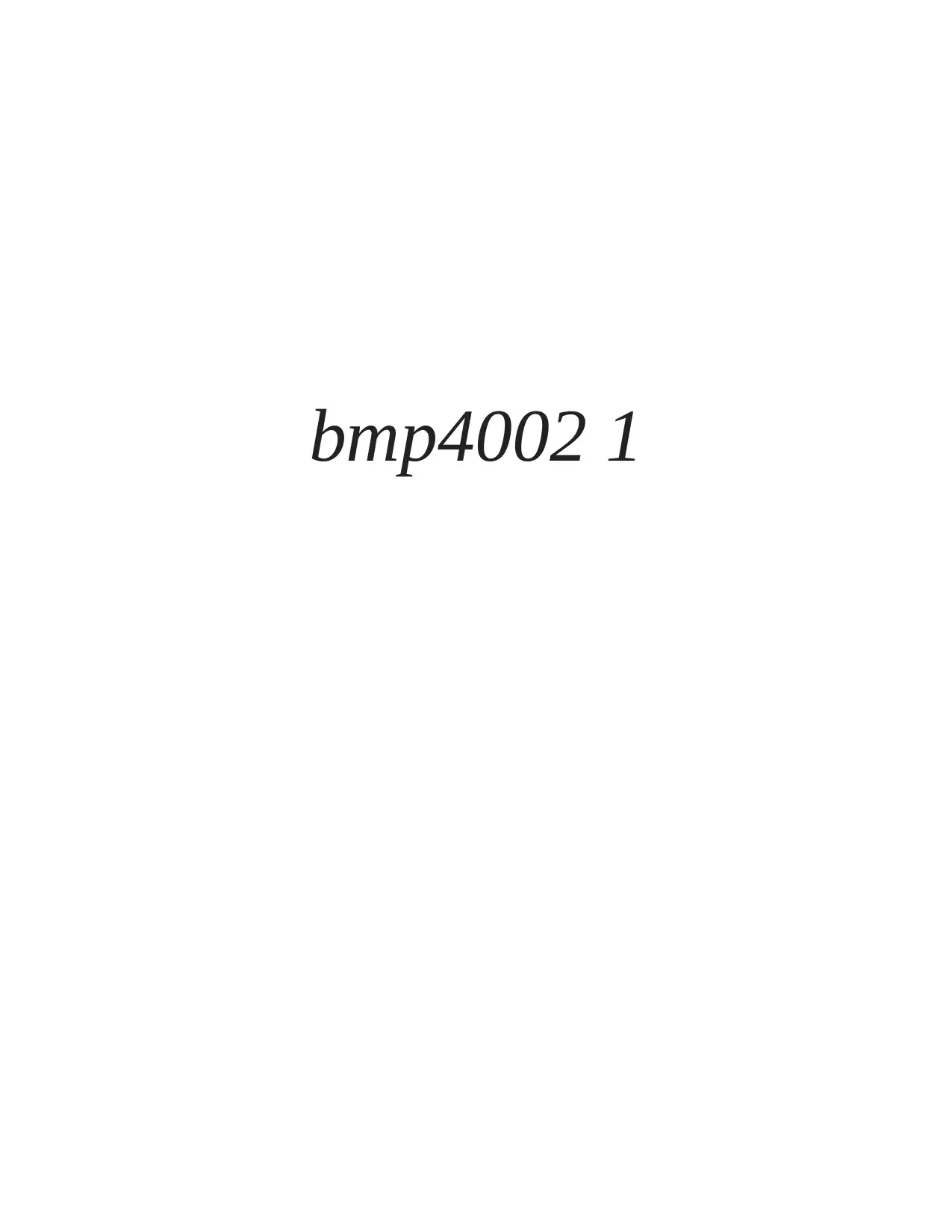
bmp4002 1
Paraphrase This Document
Need a fresh take? Get an instant paraphrase of this document with our AI Paraphraser
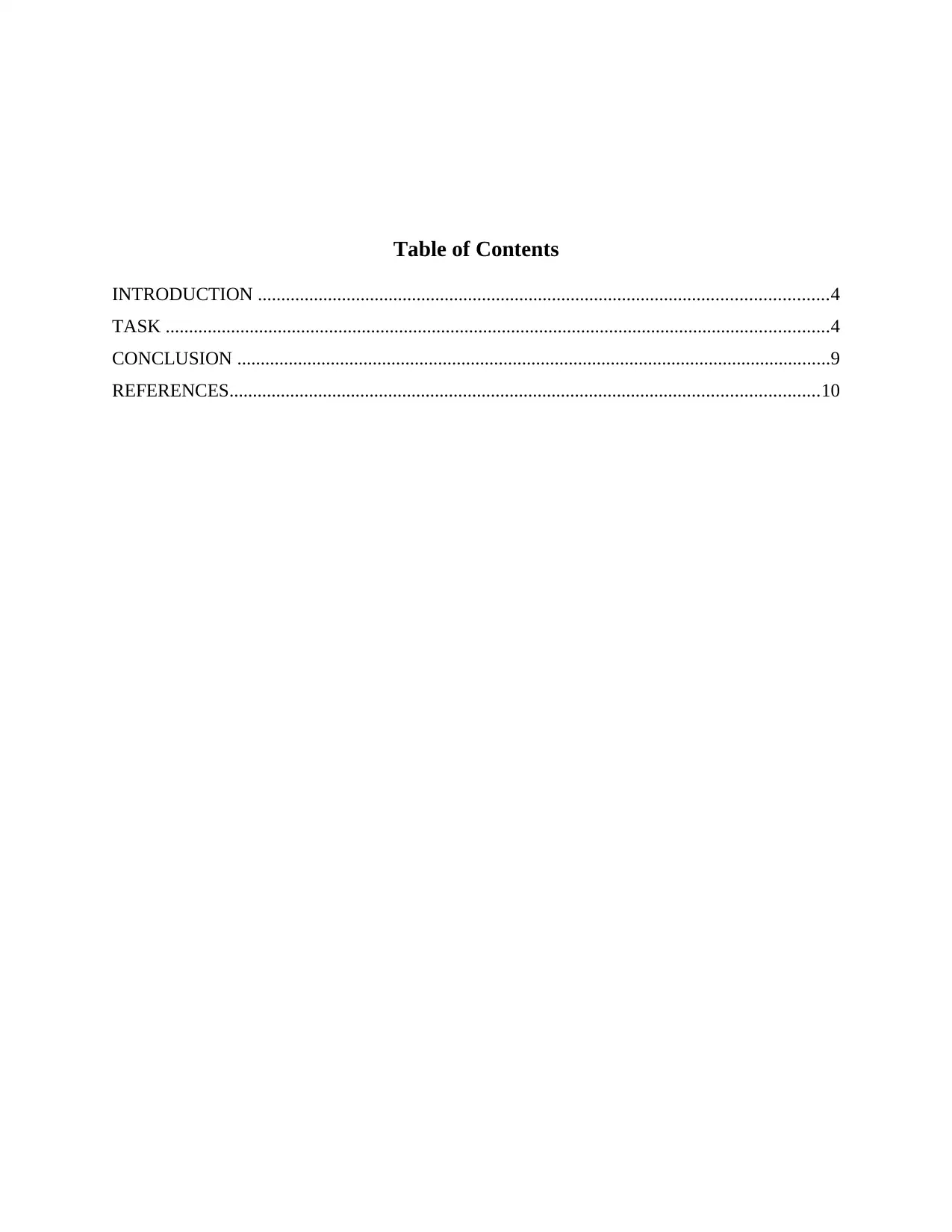
Table of Contents
INTRODUCTION ..........................................................................................................................4
TASK ..............................................................................................................................................4
CONCLUSION ...............................................................................................................................9
REFERENCES..............................................................................................................................10
INTRODUCTION ..........................................................................................................................4
TASK ..............................................................................................................................................4
CONCLUSION ...............................................................................................................................9
REFERENCES..............................................................................................................................10
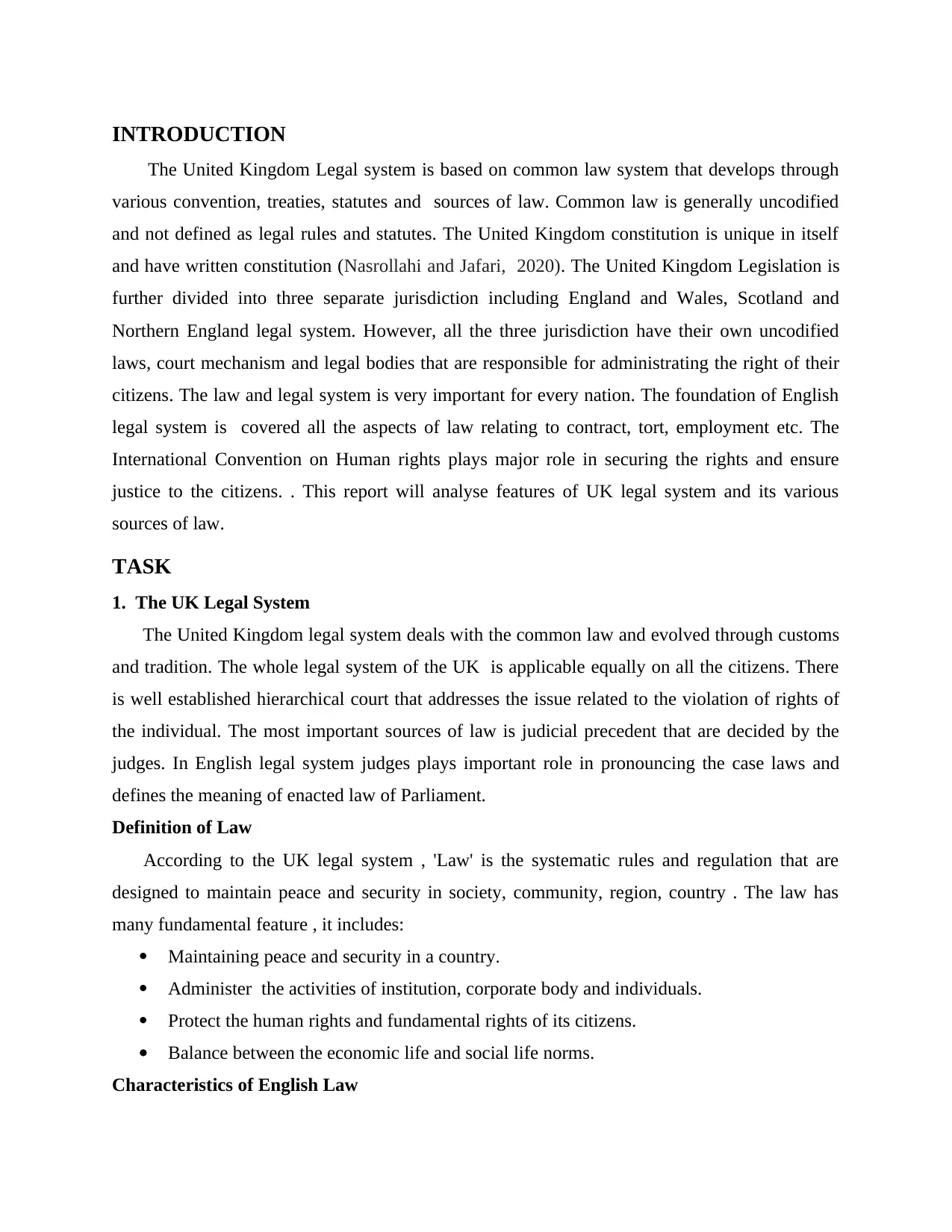
INTRODUCTION
The United Kingdom Legal system is based on common law system that develops through
various convention, treaties, statutes and sources of law. Common law is generally uncodified
and not defined as legal rules and statutes. The United Kingdom constitution is unique in itself
and have written constitution (Nasrollahi and Jafari, 2020). The United Kingdom Legislation is
further divided into three separate jurisdiction including England and Wales, Scotland and
Northern England legal system. However, all the three jurisdiction have their own uncodified
laws, court mechanism and legal bodies that are responsible for administrating the right of their
citizens. The law and legal system is very important for every nation. The foundation of English
legal system is covered all the aspects of law relating to contract, tort, employment etc. The
International Convention on Human rights plays major role in securing the rights and ensure
justice to the citizens. . This report will analyse features of UK legal system and its various
sources of law.
TASK
1. The UK Legal System
The United Kingdom legal system deals with the common law and evolved through customs
and tradition. The whole legal system of the UK is applicable equally on all the citizens. There
is well established hierarchical court that addresses the issue related to the violation of rights of
the individual. The most important sources of law is judicial precedent that are decided by the
judges. In English legal system judges plays important role in pronouncing the case laws and
defines the meaning of enacted law of Parliament.
Definition of Law
According to the UK legal system , 'Law' is the systematic rules and regulation that are
designed to maintain peace and security in society, community, region, country . The law has
many fundamental feature , it includes:
Maintaining peace and security in a country.
Administer the activities of institution, corporate body and individuals.
Protect the human rights and fundamental rights of its citizens.
Balance between the economic life and social life norms.
Characteristics of English Law
The United Kingdom Legal system is based on common law system that develops through
various convention, treaties, statutes and sources of law. Common law is generally uncodified
and not defined as legal rules and statutes. The United Kingdom constitution is unique in itself
and have written constitution (Nasrollahi and Jafari, 2020). The United Kingdom Legislation is
further divided into three separate jurisdiction including England and Wales, Scotland and
Northern England legal system. However, all the three jurisdiction have their own uncodified
laws, court mechanism and legal bodies that are responsible for administrating the right of their
citizens. The law and legal system is very important for every nation. The foundation of English
legal system is covered all the aspects of law relating to contract, tort, employment etc. The
International Convention on Human rights plays major role in securing the rights and ensure
justice to the citizens. . This report will analyse features of UK legal system and its various
sources of law.
TASK
1. The UK Legal System
The United Kingdom legal system deals with the common law and evolved through customs
and tradition. The whole legal system of the UK is applicable equally on all the citizens. There
is well established hierarchical court that addresses the issue related to the violation of rights of
the individual. The most important sources of law is judicial precedent that are decided by the
judges. In English legal system judges plays important role in pronouncing the case laws and
defines the meaning of enacted law of Parliament.
Definition of Law
According to the UK legal system , 'Law' is the systematic rules and regulation that are
designed to maintain peace and security in society, community, region, country . The law has
many fundamental feature , it includes:
Maintaining peace and security in a country.
Administer the activities of institution, corporate body and individuals.
Protect the human rights and fundamental rights of its citizens.
Balance between the economic life and social life norms.
Characteristics of English Law
⊘ This is a preview!⊘
Do you want full access?
Subscribe today to unlock all pages.

Trusted by 1+ million students worldwide
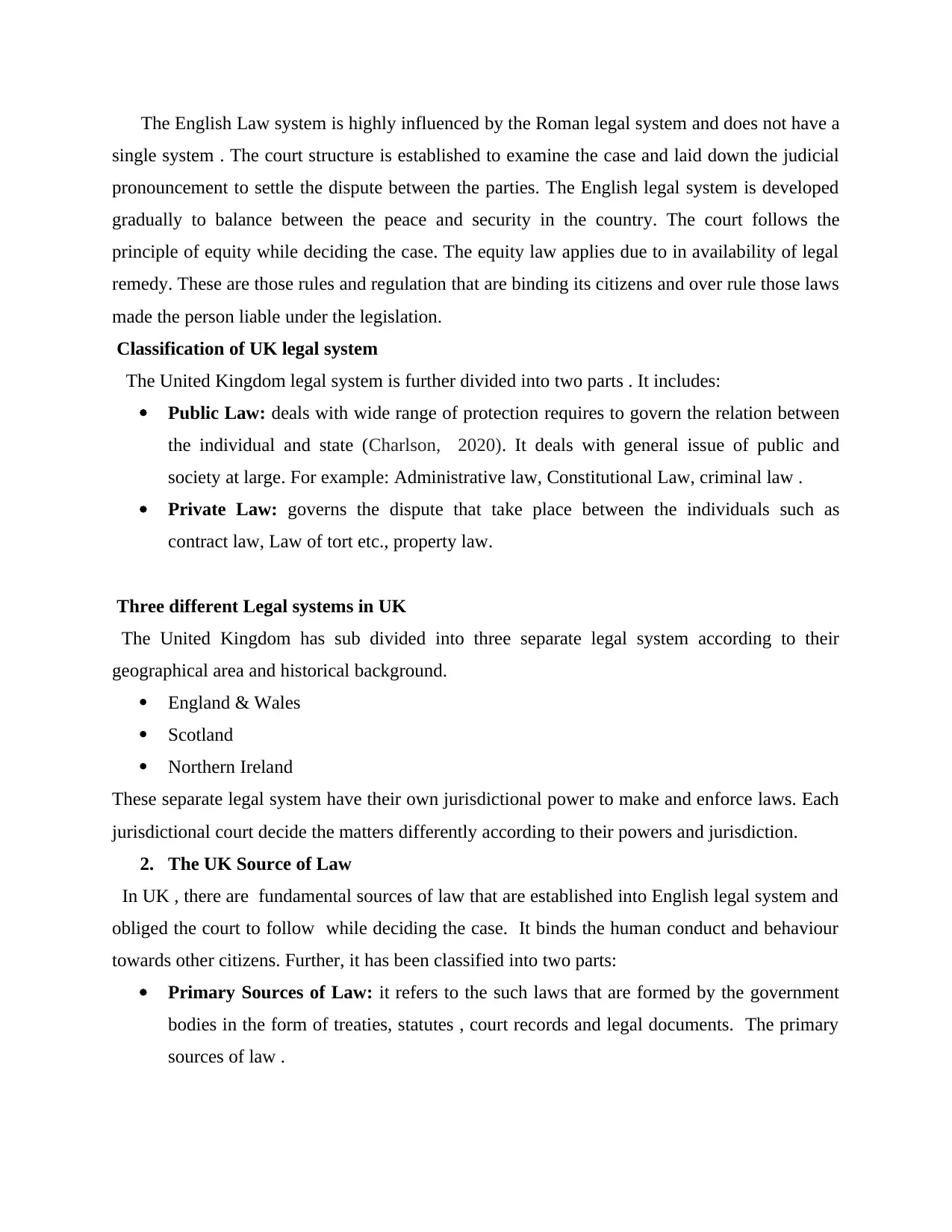
The English Law system is highly influenced by the Roman legal system and does not have a
single system . The court structure is established to examine the case and laid down the judicial
pronouncement to settle the dispute between the parties. The English legal system is developed
gradually to balance between the peace and security in the country. The court follows the
principle of equity while deciding the case. The equity law applies due to in availability of legal
remedy. These are those rules and regulation that are binding its citizens and over rule those laws
made the person liable under the legislation.
Classification of UK legal system
The United Kingdom legal system is further divided into two parts . It includes:
Public Law: deals with wide range of protection requires to govern the relation between
the individual and state (Charlson, 2020). It deals with general issue of public and
society at large. For example: Administrative law, Constitutional Law, criminal law .
Private Law: governs the dispute that take place between the individuals such as
contract law, Law of tort etc., property law.
Three different Legal systems in UK
The United Kingdom has sub divided into three separate legal system according to their
geographical area and historical background.
England & Wales
Scotland
Northern Ireland
These separate legal system have their own jurisdictional power to make and enforce laws. Each
jurisdictional court decide the matters differently according to their powers and jurisdiction.
2. The UK Source of Law
In UK , there are fundamental sources of law that are established into English legal system and
obliged the court to follow while deciding the case. It binds the human conduct and behaviour
towards other citizens. Further, it has been classified into two parts:
Primary Sources of Law: it refers to the such laws that are formed by the government
bodies in the form of treaties, statutes , court records and legal documents. The primary
sources of law .
single system . The court structure is established to examine the case and laid down the judicial
pronouncement to settle the dispute between the parties. The English legal system is developed
gradually to balance between the peace and security in the country. The court follows the
principle of equity while deciding the case. The equity law applies due to in availability of legal
remedy. These are those rules and regulation that are binding its citizens and over rule those laws
made the person liable under the legislation.
Classification of UK legal system
The United Kingdom legal system is further divided into two parts . It includes:
Public Law: deals with wide range of protection requires to govern the relation between
the individual and state (Charlson, 2020). It deals with general issue of public and
society at large. For example: Administrative law, Constitutional Law, criminal law .
Private Law: governs the dispute that take place between the individuals such as
contract law, Law of tort etc., property law.
Three different Legal systems in UK
The United Kingdom has sub divided into three separate legal system according to their
geographical area and historical background.
England & Wales
Scotland
Northern Ireland
These separate legal system have their own jurisdictional power to make and enforce laws. Each
jurisdictional court decide the matters differently according to their powers and jurisdiction.
2. The UK Source of Law
In UK , there are fundamental sources of law that are established into English legal system and
obliged the court to follow while deciding the case. It binds the human conduct and behaviour
towards other citizens. Further, it has been classified into two parts:
Primary Sources of Law: it refers to the such laws that are formed by the government
bodies in the form of treaties, statutes , court records and legal documents. The primary
sources of law .
Paraphrase This Document
Need a fresh take? Get an instant paraphrase of this document with our AI Paraphraser
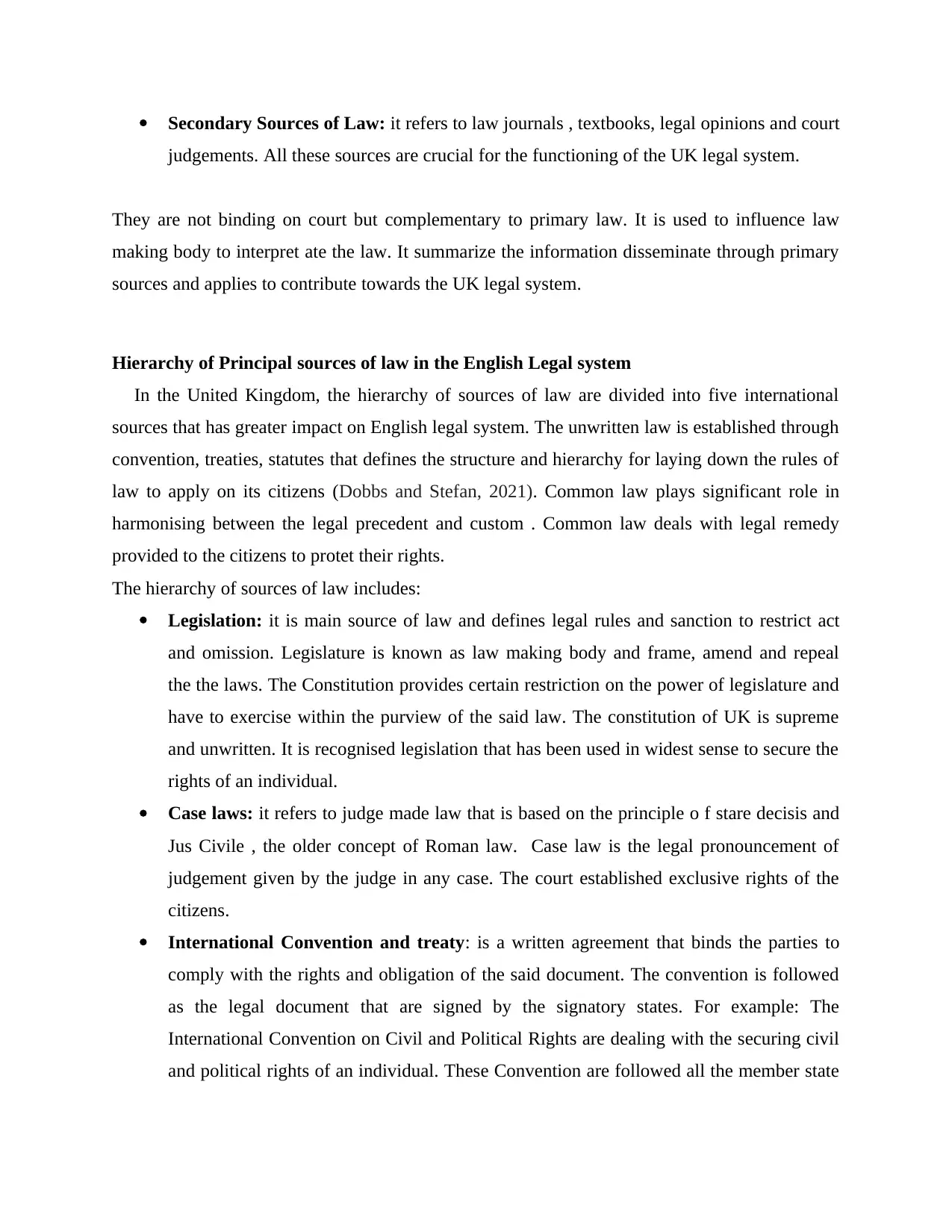
Secondary Sources of Law: it refers to law journals , textbooks, legal opinions and court
judgements. All these sources are crucial for the functioning of the UK legal system.
They are not binding on court but complementary to primary law. It is used to influence law
making body to interpret ate the law. It summarize the information disseminate through primary
sources and applies to contribute towards the UK legal system.
Hierarchy of Principal sources of law in the English Legal system
In the United Kingdom, the hierarchy of sources of law are divided into five international
sources that has greater impact on English legal system. The unwritten law is established through
convention, treaties, statutes that defines the structure and hierarchy for laying down the rules of
law to apply on its citizens (Dobbs and Stefan, 2021). Common law plays significant role in
harmonising between the legal precedent and custom . Common law deals with legal remedy
provided to the citizens to protet their rights.
The hierarchy of sources of law includes:
Legislation: it is main source of law and defines legal rules and sanction to restrict act
and omission. Legislature is known as law making body and frame, amend and repeal
the the laws. The Constitution provides certain restriction on the power of legislature and
have to exercise within the purview of the said law. The constitution of UK is supreme
and unwritten. It is recognised legislation that has been used in widest sense to secure the
rights of an individual.
Case laws: it refers to judge made law that is based on the principle o f stare decisis and
Jus Civile , the older concept of Roman law. Case law is the legal pronouncement of
judgement given by the judge in any case. The court established exclusive rights of the
citizens.
International Convention and treaty: is a written agreement that binds the parties to
comply with the rights and obligation of the said document. The convention is followed
as the legal document that are signed by the signatory states. For example: The
International Convention on Civil and Political Rights are dealing with the securing civil
and political rights of an individual. These Convention are followed all the member state
judgements. All these sources are crucial for the functioning of the UK legal system.
They are not binding on court but complementary to primary law. It is used to influence law
making body to interpret ate the law. It summarize the information disseminate through primary
sources and applies to contribute towards the UK legal system.
Hierarchy of Principal sources of law in the English Legal system
In the United Kingdom, the hierarchy of sources of law are divided into five international
sources that has greater impact on English legal system. The unwritten law is established through
convention, treaties, statutes that defines the structure and hierarchy for laying down the rules of
law to apply on its citizens (Dobbs and Stefan, 2021). Common law plays significant role in
harmonising between the legal precedent and custom . Common law deals with legal remedy
provided to the citizens to protet their rights.
The hierarchy of sources of law includes:
Legislation: it is main source of law and defines legal rules and sanction to restrict act
and omission. Legislature is known as law making body and frame, amend and repeal
the the laws. The Constitution provides certain restriction on the power of legislature and
have to exercise within the purview of the said law. The constitution of UK is supreme
and unwritten. It is recognised legislation that has been used in widest sense to secure the
rights of an individual.
Case laws: it refers to judge made law that is based on the principle o f stare decisis and
Jus Civile , the older concept of Roman law. Case law is the legal pronouncement of
judgement given by the judge in any case. The court established exclusive rights of the
citizens.
International Convention and treaty: is a written agreement that binds the parties to
comply with the rights and obligation of the said document. The convention is followed
as the legal document that are signed by the signatory states. For example: The
International Convention on Civil and Political Rights are dealing with the securing civil
and political rights of an individual. These Convention are followed all the member state
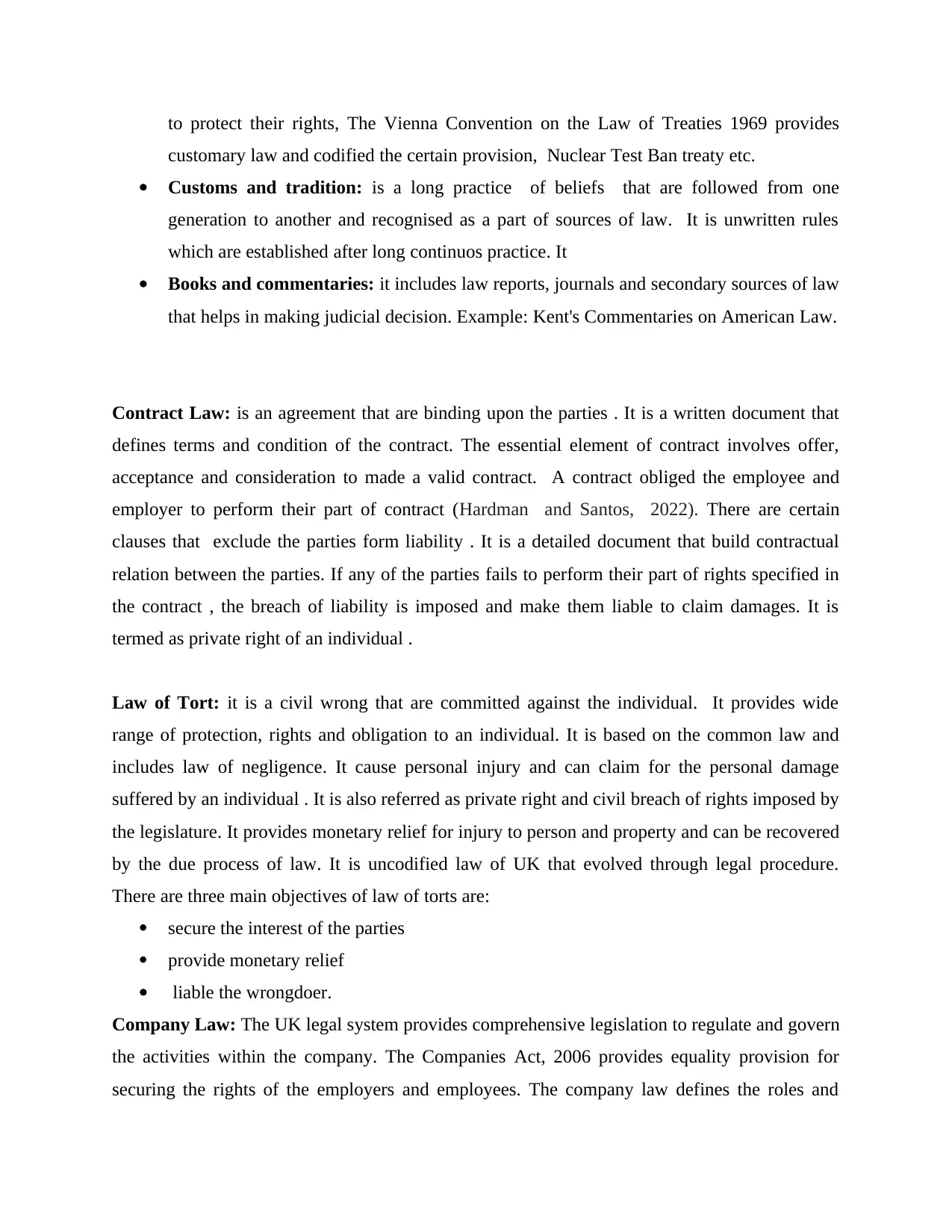
to protect their rights, The Vienna Convention on the Law of Treaties 1969 provides
customary law and codified the certain provision, Nuclear Test Ban treaty etc.
Customs and tradition: is a long practice of beliefs that are followed from one
generation to another and recognised as a part of sources of law. It is unwritten rules
which are established after long continuos practice. It
Books and commentaries: it includes law reports, journals and secondary sources of law
that helps in making judicial decision. Example: Kent's Commentaries on American Law.
Contract Law: is an agreement that are binding upon the parties . It is a written document that
defines terms and condition of the contract. The essential element of contract involves offer,
acceptance and consideration to made a valid contract. A contract obliged the employee and
employer to perform their part of contract (Hardman and Santos, 2022). There are certain
clauses that exclude the parties form liability . It is a detailed document that build contractual
relation between the parties. If any of the parties fails to perform their part of rights specified in
the contract , the breach of liability is imposed and make them liable to claim damages. It is
termed as private right of an individual .
Law of Tort: it is a civil wrong that are committed against the individual. It provides wide
range of protection, rights and obligation to an individual. It is based on the common law and
includes law of negligence. It cause personal injury and can claim for the personal damage
suffered by an individual . It is also referred as private right and civil breach of rights imposed by
the legislature. It provides monetary relief for injury to person and property and can be recovered
by the due process of law. It is uncodified law of UK that evolved through legal procedure.
There are three main objectives of law of torts are:
secure the interest of the parties
provide monetary relief
liable the wrongdoer.
Company Law: The UK legal system provides comprehensive legislation to regulate and govern
the activities within the company. The Companies Act, 2006 provides equality provision for
securing the rights of the employers and employees. The company law defines the roles and
customary law and codified the certain provision, Nuclear Test Ban treaty etc.
Customs and tradition: is a long practice of beliefs that are followed from one
generation to another and recognised as a part of sources of law. It is unwritten rules
which are established after long continuos practice. It
Books and commentaries: it includes law reports, journals and secondary sources of law
that helps in making judicial decision. Example: Kent's Commentaries on American Law.
Contract Law: is an agreement that are binding upon the parties . It is a written document that
defines terms and condition of the contract. The essential element of contract involves offer,
acceptance and consideration to made a valid contract. A contract obliged the employee and
employer to perform their part of contract (Hardman and Santos, 2022). There are certain
clauses that exclude the parties form liability . It is a detailed document that build contractual
relation between the parties. If any of the parties fails to perform their part of rights specified in
the contract , the breach of liability is imposed and make them liable to claim damages. It is
termed as private right of an individual .
Law of Tort: it is a civil wrong that are committed against the individual. It provides wide
range of protection, rights and obligation to an individual. It is based on the common law and
includes law of negligence. It cause personal injury and can claim for the personal damage
suffered by an individual . It is also referred as private right and civil breach of rights imposed by
the legislature. It provides monetary relief for injury to person and property and can be recovered
by the due process of law. It is uncodified law of UK that evolved through legal procedure.
There are three main objectives of law of torts are:
secure the interest of the parties
provide monetary relief
liable the wrongdoer.
Company Law: The UK legal system provides comprehensive legislation to regulate and govern
the activities within the company. The Companies Act, 2006 provides equality provision for
securing the rights of the employers and employees. The company law defines the roles and
⊘ This is a preview!⊘
Do you want full access?
Subscribe today to unlock all pages.

Trusted by 1+ million students worldwide
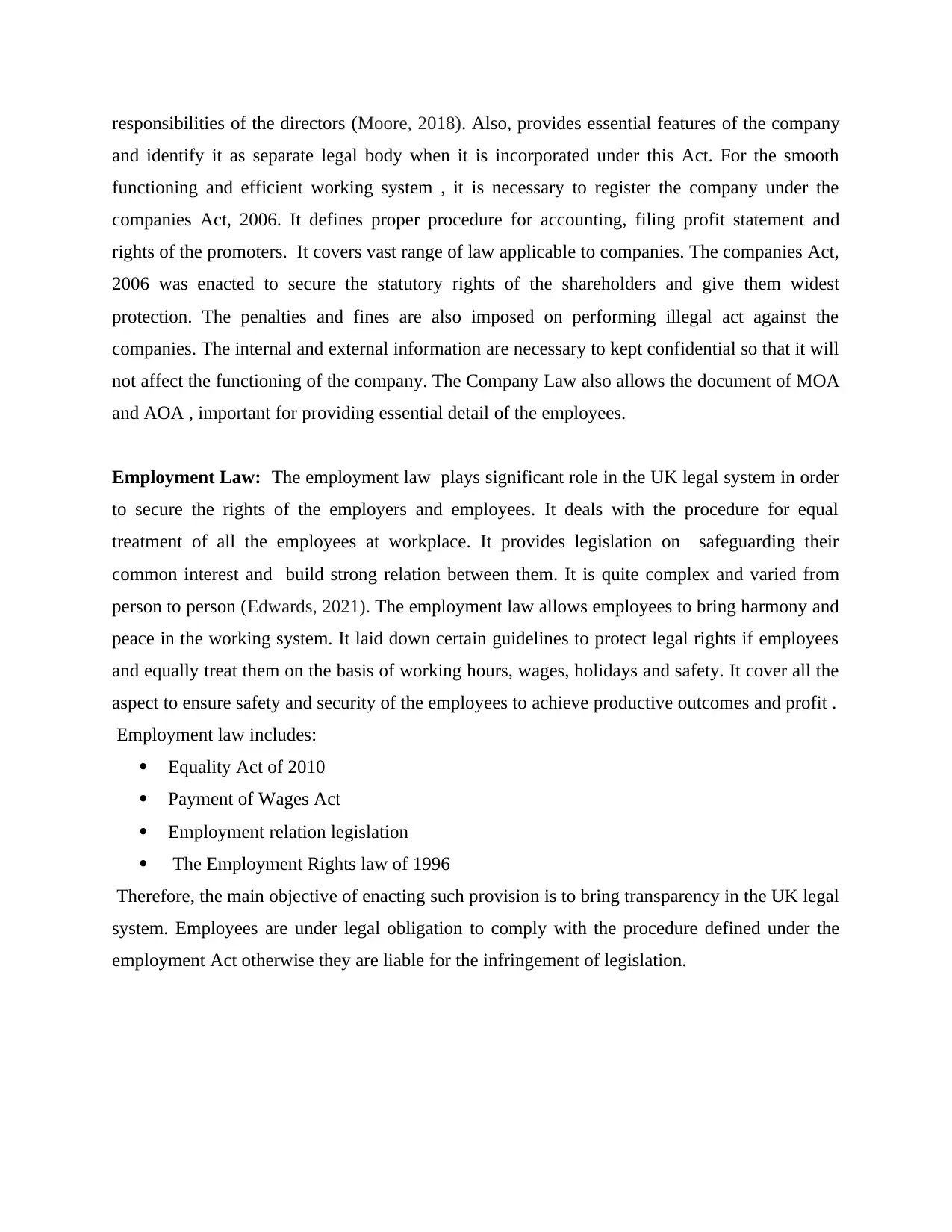
responsibilities of the directors (Moore, 2018). Also, provides essential features of the company
and identify it as separate legal body when it is incorporated under this Act. For the smooth
functioning and efficient working system , it is necessary to register the company under the
companies Act, 2006. It defines proper procedure for accounting, filing profit statement and
rights of the promoters. It covers vast range of law applicable to companies. The companies Act,
2006 was enacted to secure the statutory rights of the shareholders and give them widest
protection. The penalties and fines are also imposed on performing illegal act against the
companies. The internal and external information are necessary to kept confidential so that it will
not affect the functioning of the company. The Company Law also allows the document of MOA
and AOA , important for providing essential detail of the employees.
Employment Law: The employment law plays significant role in the UK legal system in order
to secure the rights of the employers and employees. It deals with the procedure for equal
treatment of all the employees at workplace. It provides legislation on safeguarding their
common interest and build strong relation between them. It is quite complex and varied from
person to person (Edwards, 2021). The employment law allows employees to bring harmony and
peace in the working system. It laid down certain guidelines to protect legal rights if employees
and equally treat them on the basis of working hours, wages, holidays and safety. It cover all the
aspect to ensure safety and security of the employees to achieve productive outcomes and profit .
Employment law includes:
Equality Act of 2010
Payment of Wages Act
Employment relation legislation
The Employment Rights law of 1996
Therefore, the main objective of enacting such provision is to bring transparency in the UK legal
system. Employees are under legal obligation to comply with the procedure defined under the
employment Act otherwise they are liable for the infringement of legislation.
and identify it as separate legal body when it is incorporated under this Act. For the smooth
functioning and efficient working system , it is necessary to register the company under the
companies Act, 2006. It defines proper procedure for accounting, filing profit statement and
rights of the promoters. It covers vast range of law applicable to companies. The companies Act,
2006 was enacted to secure the statutory rights of the shareholders and give them widest
protection. The penalties and fines are also imposed on performing illegal act against the
companies. The internal and external information are necessary to kept confidential so that it will
not affect the functioning of the company. The Company Law also allows the document of MOA
and AOA , important for providing essential detail of the employees.
Employment Law: The employment law plays significant role in the UK legal system in order
to secure the rights of the employers and employees. It deals with the procedure for equal
treatment of all the employees at workplace. It provides legislation on safeguarding their
common interest and build strong relation between them. It is quite complex and varied from
person to person (Edwards, 2021). The employment law allows employees to bring harmony and
peace in the working system. It laid down certain guidelines to protect legal rights if employees
and equally treat them on the basis of working hours, wages, holidays and safety. It cover all the
aspect to ensure safety and security of the employees to achieve productive outcomes and profit .
Employment law includes:
Equality Act of 2010
Payment of Wages Act
Employment relation legislation
The Employment Rights law of 1996
Therefore, the main objective of enacting such provision is to bring transparency in the UK legal
system. Employees are under legal obligation to comply with the procedure defined under the
employment Act otherwise they are liable for the infringement of legislation.
Paraphrase This Document
Need a fresh take? Get an instant paraphrase of this document with our AI Paraphraser
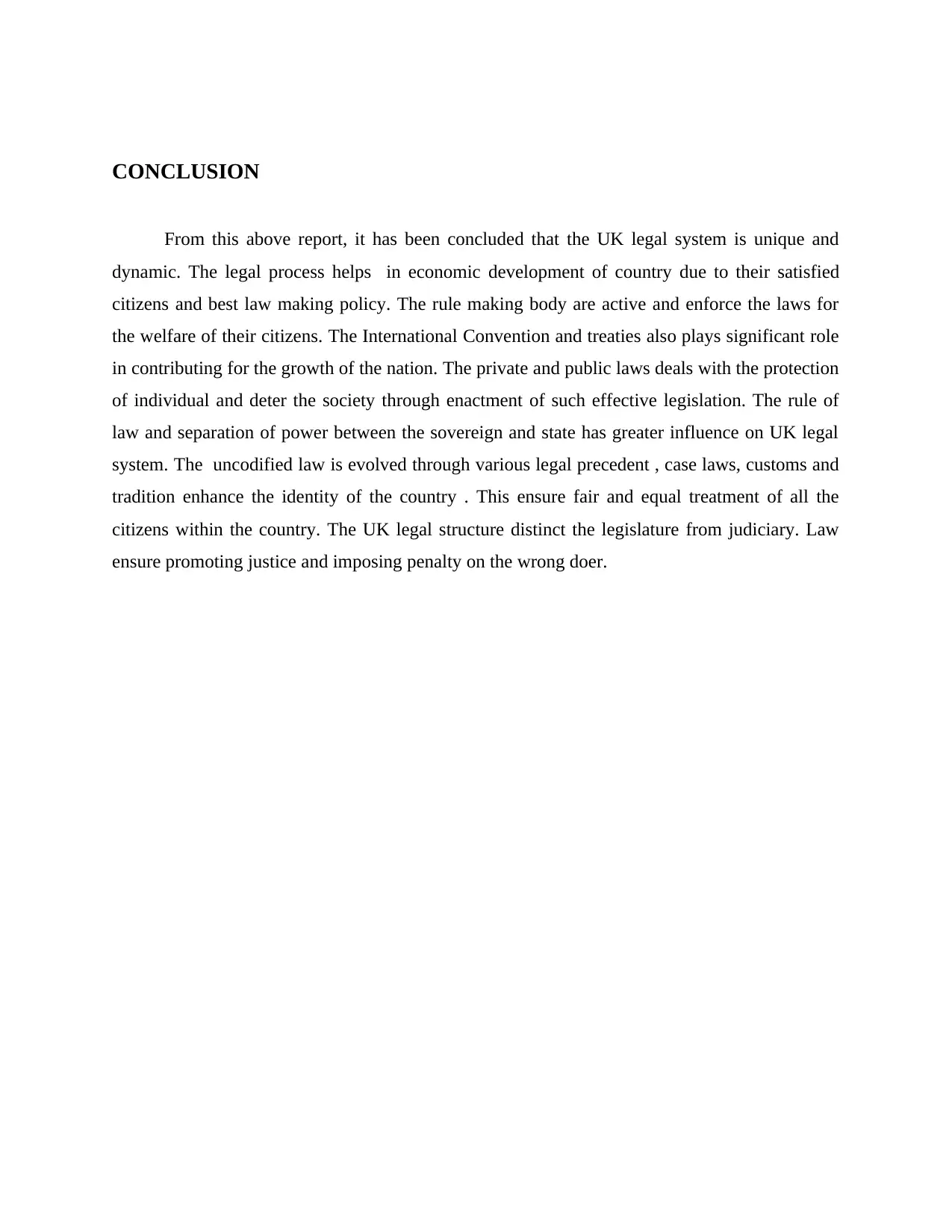
CONCLUSION
From this above report, it has been concluded that the UK legal system is unique and
dynamic. The legal process helps in economic development of country due to their satisfied
citizens and best law making policy. The rule making body are active and enforce the laws for
the welfare of their citizens. The International Convention and treaties also plays significant role
in contributing for the growth of the nation. The private and public laws deals with the protection
of individual and deter the society through enactment of such effective legislation. The rule of
law and separation of power between the sovereign and state has greater influence on UK legal
system. The uncodified law is evolved through various legal precedent , case laws, customs and
tradition enhance the identity of the country . This ensure fair and equal treatment of all the
citizens within the country. The UK legal structure distinct the legislature from judiciary. Law
ensure promoting justice and imposing penalty on the wrong doer.
From this above report, it has been concluded that the UK legal system is unique and
dynamic. The legal process helps in economic development of country due to their satisfied
citizens and best law making policy. The rule making body are active and enforce the laws for
the welfare of their citizens. The International Convention and treaties also plays significant role
in contributing for the growth of the nation. The private and public laws deals with the protection
of individual and deter the society through enactment of such effective legislation. The rule of
law and separation of power between the sovereign and state has greater influence on UK legal
system. The uncodified law is evolved through various legal precedent , case laws, customs and
tradition enhance the identity of the country . This ensure fair and equal treatment of all the
citizens within the country. The UK legal structure distinct the legislature from judiciary. Law
ensure promoting justice and imposing penalty on the wrong doer.
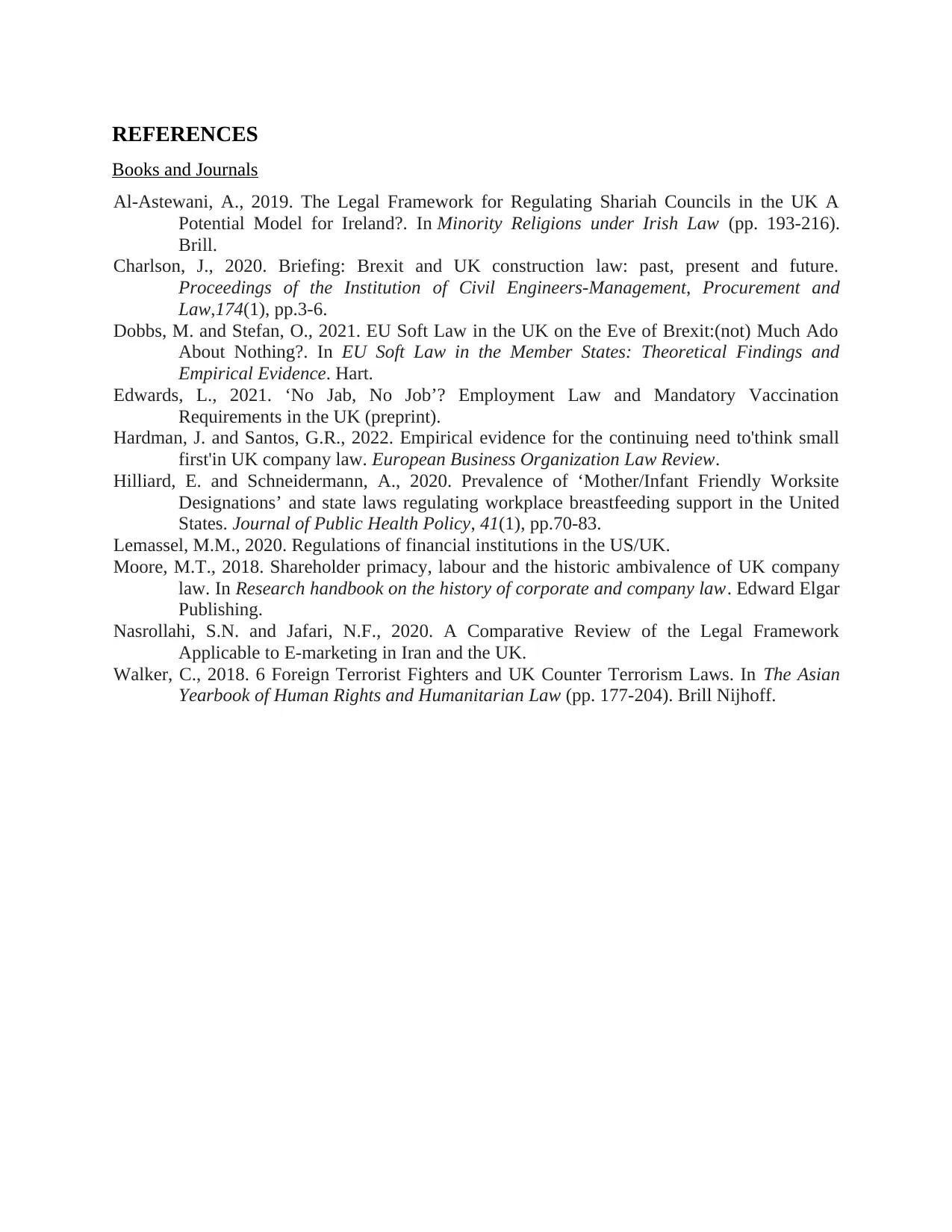
REFERENCES
Books and Journals
Al-Astewani, A., 2019. The Legal Framework for Regulating Shariah Councils in the UK A
Potential Model for Ireland?. In Minority Religions under Irish Law (pp. 193-216).
Brill.
Charlson, J., 2020. Briefing: Brexit and UK construction law: past, present and future.
Proceedings of the Institution of Civil Engineers-Management, Procurement and
Law,174(1), pp.3-6.
Dobbs, M. and Stefan, O., 2021. EU Soft Law in the UK on the Eve of Brexit:(not) Much Ado
About Nothing?. In EU Soft Law in the Member States: Theoretical Findings and
Empirical Evidence. Hart.
Edwards, L., 2021. ‘No Jab, No Job’? Employment Law and Mandatory Vaccination
Requirements in the UK (preprint).
Hardman, J. and Santos, G.R., 2022. Empirical evidence for the continuing need to'think small
first'in UK company law. European Business Organization Law Review.
Hilliard, E. and Schneidermann, A., 2020. Prevalence of ‘Mother/Infant Friendly Worksite
Designations’ and state laws regulating workplace breastfeeding support in the United
States. Journal of Public Health Policy, 41(1), pp.70-83.
Lemassel, M.M., 2020. Regulations of financial institutions in the US/UK.
Moore, M.T., 2018. Shareholder primacy, labour and the historic ambivalence of UK company
law. In Research handbook on the history of corporate and company law. Edward Elgar
Publishing.
Nasrollahi, S.N. and Jafari, N.F., 2020. A Comparative Review of the Legal Framework
Applicable to E-marketing in Iran and the UK.
Walker, C., 2018. 6 Foreign Terrorist Fighters and UK Counter Terrorism Laws. In The Asian
Yearbook of Human Rights and Humanitarian Law (pp. 177-204). Brill Nijhoff.
Books and Journals
Al-Astewani, A., 2019. The Legal Framework for Regulating Shariah Councils in the UK A
Potential Model for Ireland?. In Minority Religions under Irish Law (pp. 193-216).
Brill.
Charlson, J., 2020. Briefing: Brexit and UK construction law: past, present and future.
Proceedings of the Institution of Civil Engineers-Management, Procurement and
Law,174(1), pp.3-6.
Dobbs, M. and Stefan, O., 2021. EU Soft Law in the UK on the Eve of Brexit:(not) Much Ado
About Nothing?. In EU Soft Law in the Member States: Theoretical Findings and
Empirical Evidence. Hart.
Edwards, L., 2021. ‘No Jab, No Job’? Employment Law and Mandatory Vaccination
Requirements in the UK (preprint).
Hardman, J. and Santos, G.R., 2022. Empirical evidence for the continuing need to'think small
first'in UK company law. European Business Organization Law Review.
Hilliard, E. and Schneidermann, A., 2020. Prevalence of ‘Mother/Infant Friendly Worksite
Designations’ and state laws regulating workplace breastfeeding support in the United
States. Journal of Public Health Policy, 41(1), pp.70-83.
Lemassel, M.M., 2020. Regulations of financial institutions in the US/UK.
Moore, M.T., 2018. Shareholder primacy, labour and the historic ambivalence of UK company
law. In Research handbook on the history of corporate and company law. Edward Elgar
Publishing.
Nasrollahi, S.N. and Jafari, N.F., 2020. A Comparative Review of the Legal Framework
Applicable to E-marketing in Iran and the UK.
Walker, C., 2018. 6 Foreign Terrorist Fighters and UK Counter Terrorism Laws. In The Asian
Yearbook of Human Rights and Humanitarian Law (pp. 177-204). Brill Nijhoff.
⊘ This is a preview!⊘
Do you want full access?
Subscribe today to unlock all pages.

Trusted by 1+ million students worldwide
1 out of 9
Related Documents
Your All-in-One AI-Powered Toolkit for Academic Success.
+13062052269
info@desklib.com
Available 24*7 on WhatsApp / Email
![[object Object]](/_next/static/media/star-bottom.7253800d.svg)
Unlock your academic potential
Copyright © 2020–2025 A2Z Services. All Rights Reserved. Developed and managed by ZUCOL.



